外研版(2019)必修 第一册Unit 4 Friends forever Using language(2)—Listening课件(共15张ppt)
文档属性
| 名称 | 外研版(2019)必修 第一册Unit 4 Friends forever Using language(2)—Listening课件(共15张ppt) |  | |
| 格式 | pptx | ||
| 文件大小 | 4.4MB | ||
| 资源类型 | 教案 | ||
| 版本资源 | 外研版(2019) | ||
| 科目 | 英语 | ||
| 更新时间 | 2023-10-09 20:29:47 | ||
图片预览

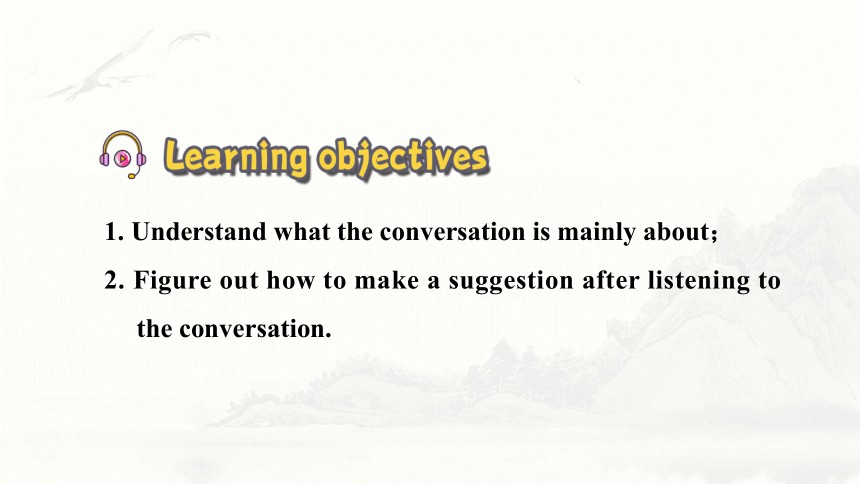
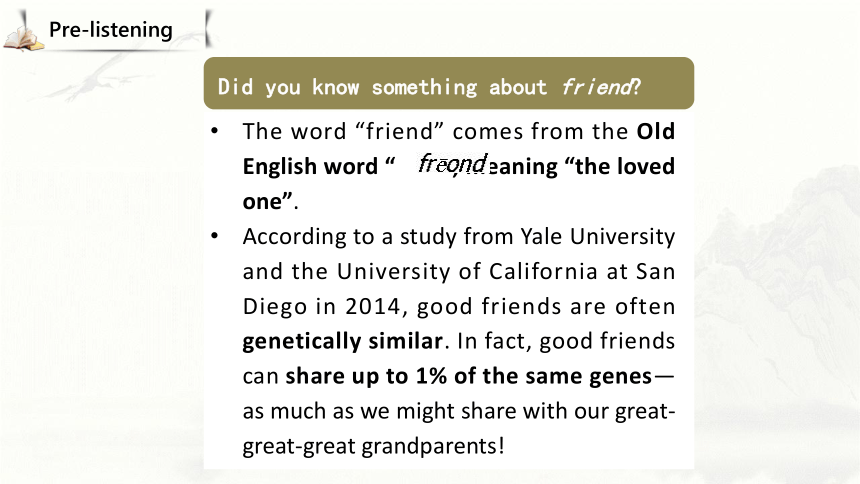
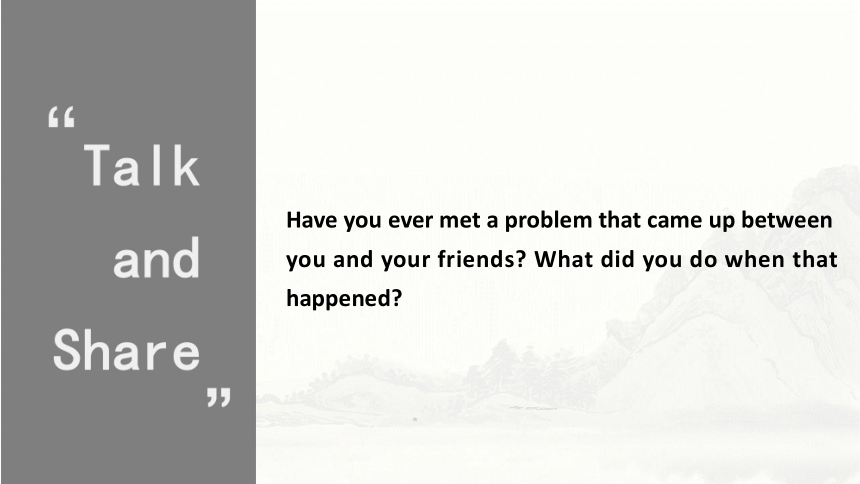
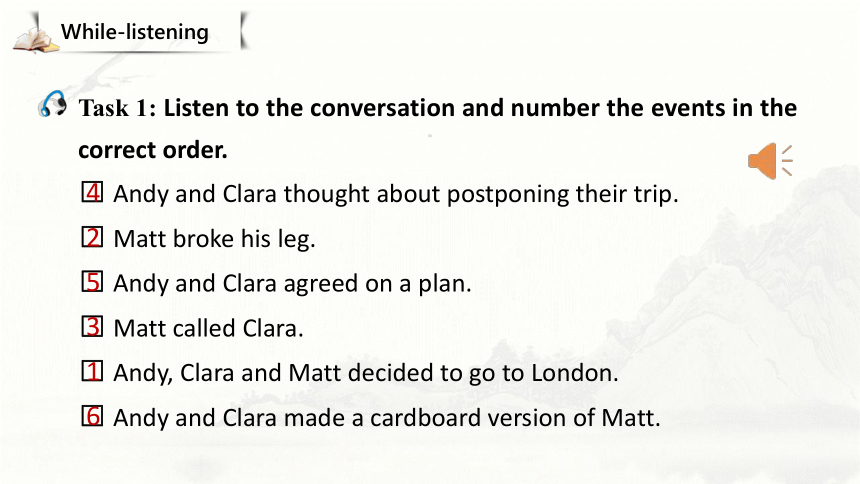
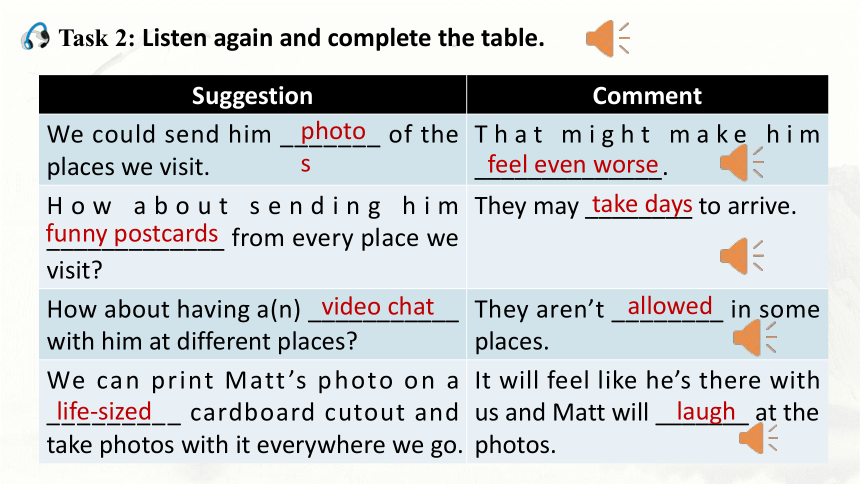
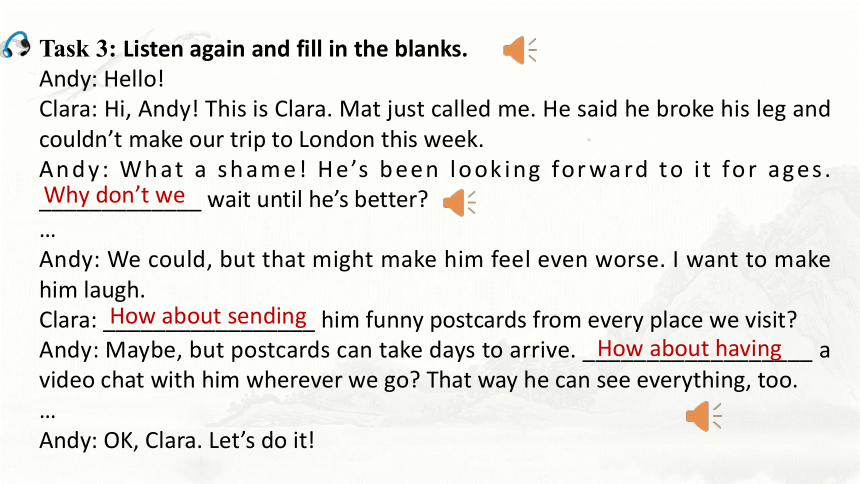
文档简介
(共15张PPT)
Using language(2)—Listening
Friends forever
Unit 4
1. Understand what the conversation is mainly about;
2. Figure out how to make a suggestion after listening to the conversation.
Did you know something about friend
The word “friend” comes from the Old English word “ ”, meaning “the loved one”.
According to a study from Yale University and the University of California at San Diego in 2014, good friends are often genetically similar. In fact, good friends can share up to 1% of the same genes—as much as we might share with our great-great-great grandparents!
Pre-listening
Have you ever met a problem that came up between you and your friends What did you do when that happened
Task 1: Listen to the conversation and number the events in the correct order.
□ Andy and Clara thought about postponing their trip.
□ Matt broke his leg.
□ Andy and Clara agreed on a plan.
□ Matt called Clara.
□ Andy, Clara and Matt decided to go to London.
□ Andy and Clara made a cardboard version of Matt.
4
2
5
3
1
6
While-listening
Suggestion Comment
We could send him _______ of the places we visit. That might make him ______________.
How about sending him _____________ from every place we visit They may ________ to arrive.
How about having a(n) ___________ with him at different places They aren’t ________ in some places.
We can print Matt’s photo on a _________ cardboard cutout and take photos with it everywhere we go. It will feel like he’s there with us and Matt will _______ at the photos.
photos
feel even worse
funny postcards
take days
video chat
allowed
life-sized
laugh
Task 2: Listen again and complete the table.
Task 3: Listen again and fill in the blanks.
Andy: Hello!
Clara: Hi, Andy! This is Clara. Mat just called me. He said he broke his leg and couldn’t make our trip to London this week.
Andy: What a shame! He’s been looking forward to it for ages. _____________ wait until he’s better
…
Andy: We could, but that might make him feel even worse. I want to make him laugh.
Clara: _________________ him funny postcards from every place we visit
Andy: Maybe, but postcards can take days to arrive. __________________ a video chat with him wherever we go That way he can see everything, too.
…
Andy: OK, Clara. Let’s do it!
Why don’t we
How about sending
How about having
Task 4: Now talk about how Andy and Clara give suggestions.
Why don’t we wait until he is better
How about sending him funny postcards from every place we visit
How about having a video chat with him wherever we go
Why don’t we take Matt with us
When you make a suggestion, use less direct language than you would to make a statement or give an order. This makes it clear to the other person that you are giving them a choice. For example, you can begin with expressions such as Why don’t we do sth. How about doing sth. or use a past tense to distance yourself from the suggestion: I was wondering whether...
Learning to learn
Andy: Hello!
Clara: Hi, Andy! This is Clara. Mat just called me. He said he broke his leg and couldn’t make our trip to London this week.
Andy: What a shame! He’s been looking forward to it for ages. Why don’t we wait until he’s better
Clara: He said we should go without him. It will take quite a while for him to get well again. He doesn’t want us to give up our holiday because of him.
Andy: But Matt is our friend. He needs our comfort and support. Let’s think about ways to cheer him up!
Clara: You’re right! We could send him photos of the places we visit.
Transcript
Andy: We could, but that might make him feel even worse. I want to make him laugh.
Clara: How about sending him funny postcards from every place we visit
Andy: Maybe, but postcards can take days to arrive. How about having a video chat with him wherever we go That way he can see everything, too.
Clara: That’s a good idea. But you aren’t allowed to take videos in some places. OK, I’ve got it — why don’t we take Matt with us
Andy: What about his broken leg
Clara: Not the real Matt. Let’s make a “Flat Matt”!
Andy: What !
Clara: We can print Matt’s photo on a life-sized cardboard cutout. We’ll then take it with us and whenever we take photos in London...
Andy: [interrupts] Matt will be in the photos, too, as if he were there with us.
Clara: That’s right! “Flat Matt”will go to London with us, and the real Matt will laugh at the photos.
Andy: OK, Clara. Let’s do it!
Work in pairs. Make up a conversation and act it out with your deskmate.
One of your friends has been avoiding you all week. He/She doesn’t talk to you and refuses to text or phone you back. Ask student B for suggestions and give comments on them.
Student A has a problem and needs your help. Find out what the problem is and give him/her some suggestions as to how to solve it.
Post-listening
1. There exists a problem between...
2. have difficulty in dealing with...
3. I would appreciate it if...
4. Can you help me with...
5. I’d like your advice about...
6. What can I do...
7. Do you think I should...
8. Maybe, but...
9. That might work.
1. You should...
2. How about...
3. Perhaps you could...
4. It might be a good idea/bad idea to...
5. Why don’t you....
Now work with your deskmate to act out the conversation.
Show Time
Using language(2)—Listening
Friends forever
Unit 4
1. Understand what the conversation is mainly about;
2. Figure out how to make a suggestion after listening to the conversation.
Did you know something about friend
The word “friend” comes from the Old English word “ ”, meaning “the loved one”.
According to a study from Yale University and the University of California at San Diego in 2014, good friends are often genetically similar. In fact, good friends can share up to 1% of the same genes—as much as we might share with our great-great-great grandparents!
Pre-listening
Have you ever met a problem that came up between you and your friends What did you do when that happened
Task 1: Listen to the conversation and number the events in the correct order.
□ Andy and Clara thought about postponing their trip.
□ Matt broke his leg.
□ Andy and Clara agreed on a plan.
□ Matt called Clara.
□ Andy, Clara and Matt decided to go to London.
□ Andy and Clara made a cardboard version of Matt.
4
2
5
3
1
6
While-listening
Suggestion Comment
We could send him _______ of the places we visit. That might make him ______________.
How about sending him _____________ from every place we visit They may ________ to arrive.
How about having a(n) ___________ with him at different places They aren’t ________ in some places.
We can print Matt’s photo on a _________ cardboard cutout and take photos with it everywhere we go. It will feel like he’s there with us and Matt will _______ at the photos.
photos
feel even worse
funny postcards
take days
video chat
allowed
life-sized
laugh
Task 2: Listen again and complete the table.
Task 3: Listen again and fill in the blanks.
Andy: Hello!
Clara: Hi, Andy! This is Clara. Mat just called me. He said he broke his leg and couldn’t make our trip to London this week.
Andy: What a shame! He’s been looking forward to it for ages. _____________ wait until he’s better
…
Andy: We could, but that might make him feel even worse. I want to make him laugh.
Clara: _________________ him funny postcards from every place we visit
Andy: Maybe, but postcards can take days to arrive. __________________ a video chat with him wherever we go That way he can see everything, too.
…
Andy: OK, Clara. Let’s do it!
Why don’t we
How about sending
How about having
Task 4: Now talk about how Andy and Clara give suggestions.
Why don’t we wait until he is better
How about sending him funny postcards from every place we visit
How about having a video chat with him wherever we go
Why don’t we take Matt with us
When you make a suggestion, use less direct language than you would to make a statement or give an order. This makes it clear to the other person that you are giving them a choice. For example, you can begin with expressions such as Why don’t we do sth. How about doing sth. or use a past tense to distance yourself from the suggestion: I was wondering whether...
Learning to learn
Andy: Hello!
Clara: Hi, Andy! This is Clara. Mat just called me. He said he broke his leg and couldn’t make our trip to London this week.
Andy: What a shame! He’s been looking forward to it for ages. Why don’t we wait until he’s better
Clara: He said we should go without him. It will take quite a while for him to get well again. He doesn’t want us to give up our holiday because of him.
Andy: But Matt is our friend. He needs our comfort and support. Let’s think about ways to cheer him up!
Clara: You’re right! We could send him photos of the places we visit.
Transcript
Andy: We could, but that might make him feel even worse. I want to make him laugh.
Clara: How about sending him funny postcards from every place we visit
Andy: Maybe, but postcards can take days to arrive. How about having a video chat with him wherever we go That way he can see everything, too.
Clara: That’s a good idea. But you aren’t allowed to take videos in some places. OK, I’ve got it — why don’t we take Matt with us
Andy: What about his broken leg
Clara: Not the real Matt. Let’s make a “Flat Matt”!
Andy: What !
Clara: We can print Matt’s photo on a life-sized cardboard cutout. We’ll then take it with us and whenever we take photos in London...
Andy: [interrupts] Matt will be in the photos, too, as if he were there with us.
Clara: That’s right! “Flat Matt”will go to London with us, and the real Matt will laugh at the photos.
Andy: OK, Clara. Let’s do it!
Work in pairs. Make up a conversation and act it out with your deskmate.
One of your friends has been avoiding you all week. He/She doesn’t talk to you and refuses to text or phone you back. Ask student B for suggestions and give comments on them.
Student A has a problem and needs your help. Find out what the problem is and give him/her some suggestions as to how to solve it.
Post-listening
1. There exists a problem between...
2. have difficulty in dealing with...
3. I would appreciate it if...
4. Can you help me with...
5. I’d like your advice about...
6. What can I do...
7. Do you think I should...
8. Maybe, but...
9. That might work.
1. You should...
2. How about...
3. Perhaps you could...
4. It might be a good idea/bad idea to...
5. Why don’t you....
Now work with your deskmate to act out the conversation.
Show Time
